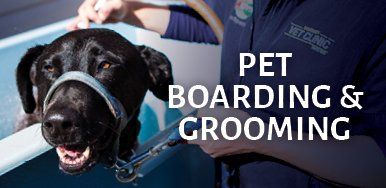BEHAVIOUR MANAGEMENT FOR YOUR DOG
Good dogs are the result of care, love, good breeding, and good training.
Behavioural problems in your dog can range from submissive urination to dangerous aggression, from destructiveness to disobedience, or from too active and playful to ignoring you completely. Identifying exactly what the cause of your dog’s behavioural problem is often half the battle.
Here’s our tips for avoiding potential pooch problems:
1. Never buy a dog on a whim
Take enough time to choose a breed that fits in with your lifestyle. Owning a dog is a long-term commitment, and can be a distressing experience if you choose an unsuitable dog.
2. Socialise your dog with other dogs and people
Take your dog to puppy pre-school or dog obedience school. It is very important for dogs, in particular puppies, to be socialised with other dogs and people. Remember – if your dog is trained and issued with a training certificate, you will receive a rebate on your dog registration fee.
3. Always supervise children with dogs
A dog’s behavior can be unpredictable, especially when left unsupervised with children. Teach your children should be calm and respectful to animals and to interact appropriately with them, not to ‘play-fight’ or play ‘tug-of-war’ games with them. Put your dog out of the way when children are playing loud games and running around as dogs can sometimes get over-excited or frightened if there is a lot of noise or if other children are visiting.
4. Teach your dog how to behave with visitor
Teach your dog to sit before you allow visitors to stroke it. Allowing it to jump up may frighten or annoy some people, and children may feel very intimidated by the behavior.
5. Always ask permission before you pat a dog you don’t know
Not all dogs like to be patted and cuddled. Ask the owner of the dog for permission to pat the dog, and if the owner agrees, allow the dog to sniff the back of your hand first. If it is happy to be patted it will sniff your hand and move towards you. You can then stroke it under the chin. Do not pat it on the top of the head - some dogs may interpret this as threatening behavior. If the dog backs away and does not sniff your hand, it is telling you it does not want to be patted.
6. Be consistent with your training and reward the desired behaviour
Do not lose your temper with your dog. It will become confused, making it difficult for the dog to learn what you are wanting to teach.
7. Never let your dog demand attention by jumping, barking, and pawing
Ignore any undesirable attention-seeking behavior, but reward all good behavior. Call your dog to you and ask it to sit or perform another task before giving it your attention. If your dog scratches the door to come in, do not open it immediately. When your dog stops scratching, ask it to sit, open the door and then allow it inside.
8. Never feed your dog from the dinner table
Feeding your dog from the dinner table encourages it to beg for food. Ask your dog to sit and stay on its bed while the family eats. When you feed your dog, ask it to sit first.
9. Never let your dog sleep on your bed or furniture
You should start with instructing your dog to sit first. Ideally, give your dog its own bed in a peaceful spot away from children and the bustle of family life.
10. A tired dog is usually a well-behaved dog
Feeding and housing your dog is not enough, it needs to spend quality time with you. Dogs, like children, have energy to burn and one way to stop your dog getting into mischief (such as digging holes and barking) is to keep its mind occupied and give it enough exercise.
11. De-sexing might be the answer
Getting your dog neutered will affect all behaviours stemming from the sex drive, almost always for the better. This includes some dominance aggression and inappropriate marking (lifting his leg). If the dog is an older dog, and the behaviours have become habitual, the effect of neutering might not be as strong. It will also take longer for the effects to be seen in an older dog, sometimes many weeks.
CONTACT A CLINIC
For further advice on the health care of your animals, contact the professional team at the Warwick Vet Clinic for a consultation.
CONTACT A CLINIC
We will get back to you as soon as possible.
Please try again later.
HEALTHY ANIMALS ARE HAPPY ANIMALS
The latest animal care information from our experienced veterinarians.
OUR CLINICS
WARWICK VETERINARY CLINIC
Opening Hours
Mon - Fri: 7:30am to 6:00pm
Sat: 8:30am to 12:00pm
Warwick West Vet Clinic
Opening Hours
Tuesday and Wednesday:
8:30am to 5:00pm
ALLORA VETERINARY CLINIC
Opening Hours
Monday - Friday:
8:30am to 5:00pm
CLIFTON VETERINARY CLINIC
Opening Hours
Tuesday, Wednesday and Friday:
9:00am to 4:00pm
Warwick Vet Clinic. Website by dms CREATiVE









